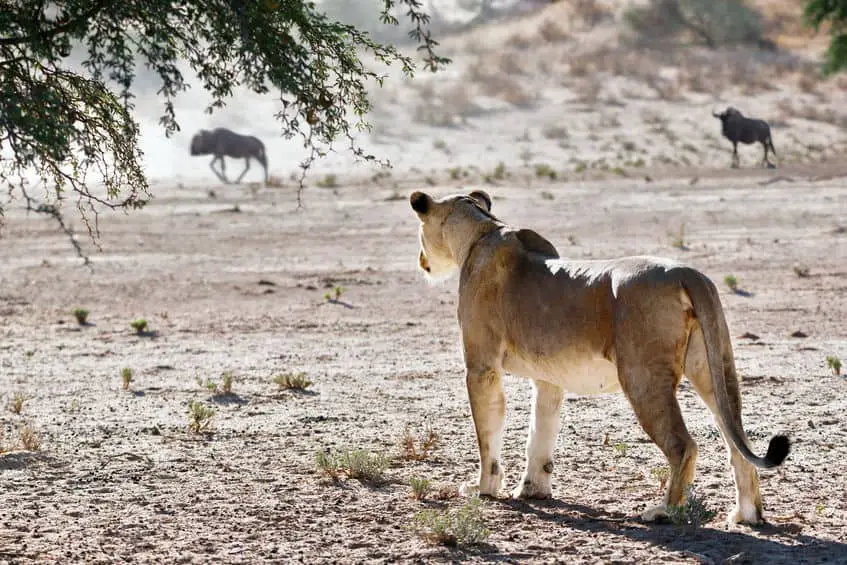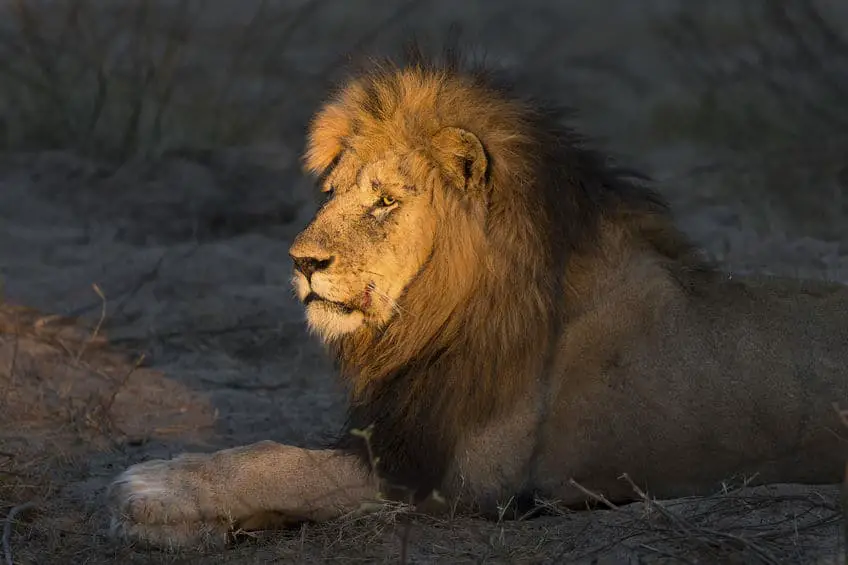
Lions are savage and fierce hunters who can and do hunt almost any other animal on the African savanna. Sometimes lions hunt on their own but the hunts are most often done in groups of several lions as this gives them some advantages.
How do Lions hunt? When hunting on their own, lions will sneak up on their target and get as close as possible before leaping. When lions hunt as a group, they will often surround their target, making it impossible to escape.
Lions express impressive intelligence when they hunt as they can adjust their hunting strategies based on the conditions and which animal they hunt. In this post, I explain the different hunting strategies lions use.
Lions Rely on Stealth and Strength When They Hunt
Lions are the biggest and strongest cats in Africa. They are known for being highly efficient and ruthless hunters.
Lions are by far the largest of the big cats of Africa and the big male lions can weigh upwards of 550 pounds (about 250 kg). The largest male ever on record weighed an incredible 600 pounds (272 kg). Female lions are a bit smaller and usually weigh around 300 pounds (around 140 kg) but can weigh up to 400 pounds (around 180 kg). But what the female lions lack in weight compared to the males, they make up for in their ability to hunt.
Lions usually rely on stealth when they hunt. They are very heavy and most of their preferred prey animals are actually able to run faster than the lions for a longer duration. For this reason, lions often need to sneak up behind their target and get as close as they can before they make their final leap forward to catch the prey.
Lions are so big and heavy that when they chase after a prey animal, they become exhausted very quickly and often have to stop the chase if they have not yet caught the prey animal after about 300 feet (close to 100 meters).
But their massive size is not at all a disadvantage. Being so large and strong allows lions to take down prey much bigger than other African predators can.
Lions use different hunting strategies for different situations and different types of prey animals.
Oftentimes lions will hunt as a group (a group of lions is called a pride) and this opens up a whole new range of possibilities for the lions including surrounding their targets to prevent them from fleeing. We will dive deeper into how lions hunt as a group and what advantages this gives them in just four more short (but interesting) paragraphs.
While lions mostly hunt together, lions hunting on their own is also far from uncommon. When lions hunt on their own, they are of course not able to surround their target and have to depend on their ability to sneak up on their unsuspecting target before they attack.
Despite being excellent hunters, lions actually also scavenge quite a bit of their food since this is often just easier than having to hunt.
We will get back to how, when, and why lions scavenge a large part of their food later in this post but first, let us take a closer look at how and why lions mostly hunt as groups.
Lions Often Hunt Together
Lions are of course very efficient and competent hunters on their own but when they hunt with the rest of their pride, which they usually do, they are in a whole new league.
When hunting as a group, lions will often surround their target from all angles and slowly move in, making it harder and harder for the target to escape. When the target notices the approaching lions, it is often too late.
In addition to surrounding their target, lions have often been observed utilizing a strategy where a few of the lions run ahead of the rest of the pride to attempt to force the target prey to move in a certain direction but what the prey animal does not know is that the rest of the pride is waiting for it in that direction.
When hunting as a group, lions can take down prey animals that are as large as up to 10 times larger than the lions themselves. This includes very large mammals such as young elephants, hippos, and rhinoceroses although these three animals are difficult to take down so lions will typically only go after them if they have to, for instance, if there are no smaller prey animals for them to hunt nearby or if the lions can isolate a young or weak individual.
The reason why lions will typically go after smaller prey than elephants, hippos, and rhinos is that aside from being very large animals, which by itself makes them harder to hunt, they also have extremely thick skin which makes it much harder for the lions to kill and eat them.
In the next section, we will dive much deeper into what exactly lions prefer to hunt.
In this short but incredible footage, you can see how a pride of lions manages to separate a Cape buffalo calf and its mother from the rest of the herd in a successful hunt.
Lions are extremely well coordinated when they hunt as a group and it is not uncommon to see a pride of lions surround prey animals from all sides, making it impossible for the poor prey animal to escape.
Lions have also often been observed killing the babies of other African predators such as leopards and cheetahs.
The lions do not seem to do this to eat the cubs but rather to reduce the risk of competition from other predators in the future.
These strategies for hunting and for reducing competition suggest an impressive intelligence in lions.
Letting the Lionesses do the Work
The female lions (called lionesses) are the primary hunters in a pride.
Lionesses are slightly smaller than male lions but this is in no way a disadvantage for the lionesses who are both significantly faster and more agile than the large, heavy male lions which makes them more efficient hunters.
Lionesses can reach speeds of around 50 miles per hour (around 80 kilometers per hour) when they chase an animal.
Male lions generally seem to be more inactive (some might even be tempted to say lazier) than the lionesses. Especially when it comes to hunting.
Male lions generally seem to prefer having others do most of the work for them.
Sometimes, however, male lions will assist the lionesses on their hunt. Especially if they are hunting a large animal that requires more lions to take down.
After a successful hunt, male lions will often make sure that they get to eat until they are full before they let anybody else near the food. If the pride has successfully taken down a large animal that contains plenty of food for the whole pride, however, the male lions will often let the lionesses and the cubs eat right away.
Lionesses have quite different behavior when it comes to eating. They will almost always let the cubs eat first.
What Prey do Lions Hunt the Most?
Lions are extremely efficient predators and they are not picky when it comes to hunting and eating.
Lions thrive the most in areas with dense populations of medium-sized or large antelopes and other hoofed animals such as zebras, wildebeests, and Cape buffalos.
Even though lions will eat almost anything, they have some clear preferences. They seem to prefer prey animals that weigh around 100 to 650 pounds (around 50 to 300 kg) as these can provide the lions with a large amount of food without being the most difficult animals to hunt and kill.
These animals are among lions’ preferred prey and food:
- Zebra
- Wildebeest
- Cape buffalo
- Oryx
- Kudu
- Impala
- Springbok
- Giraffe
- Warthog
- Waterbuck
- Sable antelope
- Other medium-sized and large antelopes and other hoofed mammals.
Lions are extremely good at adapting to their environment and what they eat depends largely on their territory and what prey animals are in it.
Among the less common hunting targets for lions are:
- Mice
- Lizards
- Birds
- Tortoises
- Small critters
- Crested porcupines
- Beetles
- Termites
- Snakes
- Crocodiles
As you can see, lions will hunt almost anything no matter the size.
When they hunt together as a group, lions can take down very large mammals including hippos, elephants, and rhinoceroses but these are rarer for the lions to hunt because they are very difficult and take a tremendous amount of energy and skill to hunt and kill. Mainly because of their massive sizes but also because they have extremely thick skin that is difficult for lions to get through.
Lions do not necessarily eat every day and are sometimes forced to go for several days without food. For that reason, they will make sure to eat as much as they possibly can when they get the chance.
Lions can eat an amount equal to up to 20% of their own body weight. For the biggest male lions, that means upwards of 110 pounds (50 kg) of meat in a single day.
If you are interested in learning more about lions’ eating habits and behavior, take a look at this post (opens in a new tab) which goes into greater detail about that topic.
When do Lions Hunt?

Lions are categorized as nocturnal or crepuscular animals. This means that they are active primarily during the night and the very early or very late hours of the day.
Lions do most of their hunting in the twilight period, which is in the early morning between dawn and sunrise and the late evening between sunset and dusk.
Take a look at this post (opens in a new tab) in which we dive deeper into the several reasons why lions are nocturnal animals and what advantages they gain from being active at night.
Most of the prey animals that lions usually prefer to hunt are primarily active during the day and more passive or even asleep during the night. This makes it much easier for lions to hunt them as they do not need to spend the same amounts of energy as they would have to during the day.
So one of the most important reasons why lions hunt at night is simply that it is much less energy-consuming than hunting during the day would be.
In addition to that, lions have an extremely strong night vision which most of their preferred prey animals do not. This gives lions another incredibly powerful advantage when they hunt during the night as it allows them to sneak up on their prey much easier.
Despite hunting mostly at night, lions can sometimes also be seen hunting during the day but this is a rather rare sight.
Usually, lions are very passive and will either rest or sleep during the day since the bright and warm sun makes hunting a too demanding and energy-consuming task but on cold and cloudy days, lions can sometimes be seen hunting since they are not faced with the challenge of the warm weather making them overheat too quickly.
So if you want to increase your chances of seeing lions that are hunting, I highly recommend going on a game drive either in the very early morning preferably before sunrise, or in the very late evening after sunset. Or try your luck during the day if the weather is cold and cloudy.
Lions Also Scavenge
Now we have learned a great deal about how, when, and what lions hunt and eat but interestingly enough, lions often acquire a large amount of their food by scavenging and stealing food from other animals rather than by hunting and catching it themselves.
I have written another post specifically about lions’ scavenging behavior including how much they scavenge, why they scavenge, what animals they go after when they scavenge and how exactly they do it. You can find that post on this link (opens in a new tab) but here are some quick, interesting facts about lions’ scavenging behavior.
In some areas of Africa, lions are just as big scavengers as spotted hyenas who are otherwise very well-known for being scavengers.
In some areas, lions even acquire as much of their food through scavenging as they do through hunting.
Lions are not picky when it comes to scavenging and they will take almost anything when they get the chance. Without the burden of having to catch their own food, lions will happily go for elephants, hippos, and rhinos which are otherwise usually too difficult to hunt due to their massive size and their thick skin but Cape buffalos, antelopes of any size, and other large, hoofed mammals such as zebras and giraffes are also more than welcome on the lions’ menu.
In short, lions will take anything they can get when someone else has done the work for them.
Lions often find dead animals by observing vultures and seeing where they strike down as this most often indicates that there is a dead animal.
Another strategy lions utilize for finding food to scavenge is to listen for hyenas that are fighting over a deal animal as this is often a rather loud and easily identifiable event.
Sometimes lions do not even need to rely on other animals when they are looking for food to scavenge and they will simply be able to find it through smell.
Male lions are generally known to be bigger food-thieves than female lions and will usually scavenge more. Male lions will actually often only hunt if they have to, for instance, if they cannot find food to scavenge.
